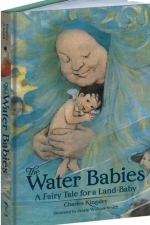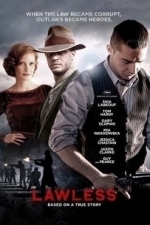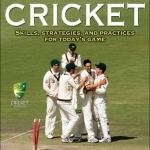
Cutting Edge Cricket
Frank Pyke and Ken Davis
Book
"Cutting Edge Cricket" brings together unrivalled advice on playing and coaching cricket from 38 of...
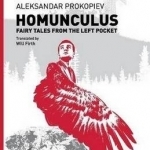
Homunculus: Fairy Tales for Adults
Aleksandar Prokopiev and Will Firth
Book
Homunculus is billed as a collection of sixteen 'fairy tales for adults' with something for every...

The FreeMind Experience: The Three Pillars of Absolute Happiness
Book
'This is the best emotional intelligence system I have ever come across.' -- Dr. Bal Rana PhD,...
Hazel (1853 KP) rated The Water Babies in Books
Oct 9, 2017
This year (2017), Calla Editions are printing a new hardback version of the original 1863 children’s classic The Water Babies written by the Anglican clergyman, Charles Kingsley (1819-75). Subtitled “A Fairytale for a land-baby” the book was intended for Kingsley’s youngest son and therefore was targeted at a juvenile demographic. However, as a result of the 1800’s vernacular and particularly deep themes, it has become more appropriate for older readers. With full-colour illustrations by Jessie Wilcox Smith (1863-1935) from the height of the golden age of illustration, this edition promises to be a collector’s item.
Charles Kingsley, the founder of England’s Christian Socialist movement, was exceedingly interested in the plight of the working class, particularly of the abuse and protection of children. This is reflected in his story about Tom, the ten-year-old London chimney sweep, who suffers ill-treatment at the hands of his employer. Tom, who has known nothing but the sooty streets of London, is embarrassed after scaring a beautiful young girl with his grimy appearance. Running away through a countryside he is unfamiliar with, Tom dives into a river to wash, however, falls asleep in the water.
On awakening, Tom discovers he has been transformed into a water baby; he can live and breathe amongst all the fishes and other mystical water creatures. Forgetting his horrible past, Tom is soon frolicking with the characters he meets, teasing and provoking unsuspecting individuals. But the fairies in charge of water babies are determined to teach him many lessons about truth, mercy, justice and courage.
The Water Babies is a morality fable with fairy-tale-like qualities. It educates young readers about the consequences of their actions but also enlightens them about the cruelty of some adults. Kingsley often talks to the reader (in this instance his son), drawing them into the story and making the scenarios as relatable as possible. The magical underwater setting is merely a veil to hide the lessons Kingsley is attempting to preach.
For the adult reader, Kingsley has a much more political message. Written at the time of political and scientific advancement, particularly in respect to the concept of natural selection, Kingsley attempts to ridicule the ideas of thinkers such as Charles Darwin by producing a satirical narrative. He suggests that scientists are fools who use unnecessarily long and foreign terms, evidenced by his use of the made-up subject of Necrobioneopalæonthydrochthonanthropopithekology. He also goes as far as to mock the majority of adults and appears to be completely anti-Irish people.
In some instances, Charles Kingsley goes too far in his satire, resulting in something that would not be accepted by publishers today. In order for Tom to be the hero of the story, adults need to be viewed as less than good – people who need to be punished for their discourteous treatment of children, which in this instance, they are, and quite graphically. But the most controversial theme explored is death. The more naïve may not cotton on to the fact that Tom falling asleep in the river equates to drowning, yet that is exactly what happened. Only through death can one become a water baby. To make matters slightly more alarming, Kingsley does not see this death as a bad thing; he describes Tom’s new life as something far better than life on earth – coming from a clergyman this is understandable – which suggests that death is better than living for an abused child.
Despite these controversies, Kingsley’s prose is humorous and entertaining - far more mind-boggling than you may initially expect. With characters named Mrs Bedonebyasyoudid and Professor Ptthmllnsprts, there is plenty to make readers laugh. Some of the hilarities may go above the heads of children since the jargon is no longer used in today’s society, however, adults will be able to appreciate the comical aspect.
Over 150 years old, The Water Babies has remained a classic. It reveals the political, scientific and social situations of the mid-1800s, yet it contains wisdom that is still relevant today. As Kingsley’s daughter Rose says in the introduction, “What a fine thing it is to love truth, mercy, justice, courage, and all things noble and of good report.” No matter how peculiar this novel is, it says a lot about the virtues of our character.
Hazel (1853 KP) rated The Water Babies in Books
Dec 7, 2018
This year (2017), Calla Editions are printing a new hardback version of the original 1863 children’s classic <i>The Water Babies</i> written by the Anglican clergyman, Charles Kingsley (1819-75). Subtitled “<i>A Fairytale for a land-baby</i>” the book was intended for Kingsley’s youngest son and therefore was targeted at a juvenile demographic. However, as a result of the 1800’s vernacular and particularly deep themes, it has become more appropriate for older readers. With full-colour illustrations by Jessie Wilcox Smith (1863-1935) from the height of the golden age of illustration, this edition promises to be a collector’s item.
Charles Kingsley, the founder of England’s Christian Socialist movement, was exceedingly interested in the plight of the working class, particularly of the abuse and protection of children. This is reflected in his story about Tom, the ten-year-old London chimney sweep, who suffers ill-treatment at the hands of his employer. Tom, who has known nothing but the sooty streets of London, is embarrassed after scaring a beautiful young girl with his grimy appearance. Running away through a countryside he is unfamiliar with, Tom dives into a river to wash, however, falls asleep in the water.
On awakening, Tom discovers he has been transformed into a water baby; he can live and breathe amongst all the fishes and other mystical water creatures. Forgetting his horrible past, Tom is soon frolicking with the characters he meets, teasing and provoking unsuspecting individuals. But the fairies in charge of water babies are determined to teach him many lessons about truth, mercy, justice and courage.
<i>The Water Babies</i> is a morality fable with fairy-tale-like qualities. It educates young readers about the consequences of their actions but also enlightens them about the cruelty of some adults. Kingsley often talks to the reader (in this instance his son), drawing them into the story and making the scenarios as relatable as possible. The magical underwater setting is merely a veil to hide the lessons Kingsley is attempting to preach.
For the adult reader, Kingsley has a much more political message. Written at the time of political and scientific advancement, particularly in respect to the concept of natural selection, Kingsley attempts to ridicule the ideas of thinkers such as Charles Darwin by producing a satirical narrative. He suggests that scientists are fools who use unnecessarily long and foreign terms, evidenced by his use of the made-up subject of <i>Necrobioneopalæonthydrochthonanthropopithekology</i>. He also goes as far as to mock the majority of adults and appears to be completely anti-Irish people.
In some instances, Charles Kingsley goes too far in his satire, resulting in something that would not be accepted by publishers today. In order for Tom to be the hero of the story, adults need to be viewed as less than good – people who need to be punished for their discourteous treatment of children, which in this instance, they are, and quite graphically. But the most controversial theme explored is death. The more naïve may not cotton on to the fact that Tom falling asleep in the river equates to drowning, yet that is exactly what happened. Only through death can one become a water baby. To make matters slightly more alarming, Kingsley does not see this death as a bad thing; he describes Tom’s new life as something far better than life on earth – coming from a clergyman this is understandable – which suggests that death is better than living for an abused child.
Despite these controversies, Kingsley’s prose is humorous and entertaining - far more mind-boggling than you may initially expect. With characters named Mrs Bedonebyasyoudid and Professor Ptthmllnsprts, there is plenty to make readers laugh. Some of the hilarities may go above the heads of children since the jargon is no longer used in today’s society, however, adults will be able to appreciate the comical aspect.
Over 150 years old, <i>The Water Babies</i> has remained a classic. It reveals the political, scientific and social situations of the mid-1800s, yet it contains wisdom that is still relevant today. As Kingsley’s daughter Rose says in the introduction, “What a fine thing it is to love truth, mercy, justice, courage, and all things noble and of good report.” No matter how peculiar this novel is, it says a lot about the virtues of our character.
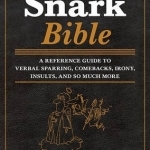
The Snark Bible: A Reference Guide to Verbal Sparring, Comebacks, Irony, Insults, and So Much More
Book
The lord of snark, Lawrence Dorfman, is back! With this treasury of backhanded compliments,...

Algorithms to Live by: The Computer Science of Human Decisions
Brian Christian and Tom Griffiths
Book
A fascinating exploration of how computer algorithms can be applied to our everyday lives. What...
Rachel King (13 KP) rated Letters to Ethan: A Grandfather's Legacy of Life & Love in Books
Feb 11, 2019
It becomes apparent in the first letter that this book has a decidedly Roman Catholic slant, and many of the letters include Catholic doctrine teachings. If the reader does not prescribe to Roman Catholicism, this can be a major obstacle to enjoying this book. The other thing that bugs me throughout the text is that I can not figure out at what age the author intended his grandson to read these letters. Some of the topics are rather mature, and they would not be appropriate for a boy that is too young to receive the advice given in the letter, no matter how well-meaning it is. I also could not decipher if McQueen's grandson, Ethan, was supposed to read these letters while his grandfather was still alive or if they were meant for after he passed - again, this would make sense if the appropriate age were given for each letter.
If I ignore the obvious bias in the letters, I found much of the advice given to be relevant and useful wisdom for a young man - or woman - attaining to adulthood.
Gareth von Kallenbach (980 KP) rated Lawless (2012) in Movies
Aug 7, 2019
While adapted from the pages of a successful book, the plot of “Lawless” portrays a familiar story. A young romance slated against the challenges of a family who is literally and metaphorically, sticking to their guns. The brilliance of the film exists in the vivid set work, understated characterization, and graphic portrayals of unbridled yet historically accurate punishments.
There are bullet holes everywhere in this wild land of violence. The depictions of torture, while not the most graphically intensive in cinema, are characterized by psychological malice. The result is a film that manages to entirely pull the viewer into a different, much less civilized, time.
Led and narrated by seasoned actor, Shia LaBeouf, as the youngest brother, Jack Bondurant, the role is hardly a challenge. Yet his performances only stands out when supported by other cast members, such as the gangster Floyd Banner, played by Gary Oldman. And while LaBeouf’s performance is not a great as it could be, it shines next to his lackluster costar, Mia Wasikowska as Bertha Minnix the forbidden preacher’s daughter and object of young Jack’s eye.
The best performance in the film is not the lead, but that of his brother Forrest who dispenses well-timed wisdom or humor even in direst situations. Further helping in the films success are the supporting characters; the third Bondurant brother, Howard (Jason Clarke), mechanically gifted family friend, Cricket Pate (Dane DeHaan), and city wise beauty Maggie Beauford (Jessica Chastain).
While not as impressive as expected, the slow but steady story and complex visceral nature of “Lawless”, make it a film that is worth the price of a ticket, for anyone who can make it through the squeamish bits.
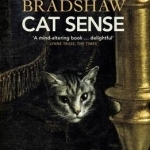
Cat Sense: The Feline Enigma Revealed
Book
From John Bradshaw, one of the world's leading experts on animal behaviour, and the author of the...
